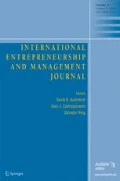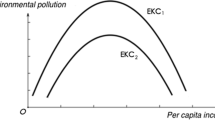Abstract
High-quality development has recently become an inevitable requirement for sustainable and healthy economic development in China, which pursues a sustainable ecology and a happy society for people while developing economy. Entrepreneurship is believed to be the essence of enterprise and one of the important factors of social economic development. This paper uses triple bottom line of sustainable development to measure high-quality economic development and studies the mutual influences between entrepreneurship and triple bottom line of sustainable development. Furthermore, this paper uses three moderating variables to study the moderation effect, including business environmental index, environmental regulation and foreign direct investment. The empirical results show that there exists a close relationship between entrepreneurship and triple bottom line of sustainable development. There are different influences of entrepreneurship and triple bottom line of sustainable development in different areas in China. The results also show that the business environment and foreign direct investment not only have direct impacts but also moderation effects on entrepreneurship towards triple bottom line of sustainable development. Environmental regulation affects environmental pollution only by the moderation effect towards entrepreneurship, and the effects are different in various areas.
Similar content being viewed by others
References
Acaravci, A., & Ozturk, I. (2010). On the relationship between energy consumption, CO2 emissions and economic growth in Europe. Energy, 35(12), 5412–5420.
Acs, Z. J., Carlsson, B., & Thurik, R. (1996). Small business in the modern economy (pp. 1–62). Oxford: Blackwell Publishers.
Arrow, K. J. (1972). Economic welfare and the allocation of resources for invention. Nber Chapters, 12, 609–626.
Audretsch, D. B., & Fritsch, M. (2003). Link entrepreneurship to growth: A case of West Germany. Industry and Innovation, 10, 65–73.
Audretsch, D. B., & Keilbach, M. (2004). Entrepreneurship capital and economic performance. Regional Studies, 38, 949–959.
Baumgartner, D., Schulz, T., & Seidl, I. (2013). Quantifying entrepreneurship and its impact on local economic performance: A spatial assessment in rural Switzerland. Entrepreneurship & Regional Development, 25(3), 222–250.
Ben, Y. A., Boubaker, S., & Omri, A. (2018). Entrepreneurship and sustainability: The need for innovative and institutional solutions. Technological Forecasting and Social Change, 129, 232–241.
Beugelsdijk, S., & Noorderhaven, N. (2004). Entrepreneurial attitude and economic growth: A cross-section of 54 regions. Annals of Regional Science, 38(2), 199–218.
Brock, W. A., & Taylor, M. S. (2010). The green Solow model. Journal of Economic Growth, 15(2), 127–153.
Costantini, V., & Monni, S. (2006). Environment, human development and economic growth. Social Science Electronic Publishing, 64(4), 867–880.
Dau, L. A., & Cazurra, A. C. (2014). To formalize or not to formalize: Entrepreneurship and pro-market institutions. Journal of Business Venturing, 29, 668–686.
Dhahri, S., & Omri, A. (2018). Entrepreneurship contribution to the three pillars of sustainable development: What does the evidence really say? World Development, 106, 64–77.
Dixon, S. E. A., & Clifford, A. (2007). Ecopreneurship: A new approach to managing the triple bottom line. Journal of Organizational Change Management, 20(3), 326–345.
Galindo, M. A., & Mendez, M. T. (2014). Entrepreneurship, economic growth, and innovation: Are feedback effects at work? Journal of Business Research, 67(5), 825–829.
Georgellis, Y., & Wall, H. (2000). What makes a region entrepreneurial? Evidence from Britain. Annals of Regional Science, 34, 385–403.
Gu, W. T., Qian, X. Z., & Lu, J. P. (2018). Venture capital and entrepreneurship: A conceptual model and research suggestions. International Entrepreneurship and Management Journal, 14(1), 35–50.
Gürlük, S. (2009). Economic growth, industrial pollution and human development in the Mediterranean region. Ecological Economics, 68, 2327–2335.
Holcombe, R. G. (1998). Entrepreneurship and economic growth. Quarterly Journal of Austrian Economics, 2, 45–62.
Huang, J., & Chen, S. H. (2011). Environmental pollution abatement and economic growth: Model and evidence from China. Nankai Economic Studies, 1, 142–152.
Itri, A. N., Ballard, D. H., Kantartzis, S., Sullivan, J. C., Weisman, J. A., Durand, D. J., Ali, S., & Kansagra, A. P. (2015). Entrepreneurship in the academic radiology environment. Academic Radiology, 22, 14–24.
Kao, C., & Chiang, M. H. (2000). On the estimation and inference of a Cointegrated regression in panel data. Advances in Econometrics, 15, 179–222 15, pp. 161–178.
King, R. G., & Levine, R. (1993). Finance, entrepreneurship and growth. Journal of Monetary Economics, 32(3), 513–542.
Knight, F. H. (1921). Risk, uncertainty and profit. Boston: Houghton Mifflin.
Lee, S., & Oh, D. (2015). Economic growth and the environment in China: Empirical evidence using prefecture level data. China Economic Review, 36, 73–85.
Li, H. B., Li, X., Yao, X. G., Zhang, H. F., & Zhang, J. S. (2009). Examining the impact of business entrepreneurship and innovation entrepreneurship on economic growth in China. Economic Research Journal, 10, 99–108.
Li, Z., Ding, T., & Li, J. (2015). Entrepreneurship and economic development in China: Evidence from a time-varying parameters stochastic volatility vector autoregressive model. Technology Analysis & Strategic Management, 27(6), 660–674.
Lucas, R. E. (1998). On the mechanics of economic development. Journal of Monetary Economics, 22, 3–39.
Majid, I. A., & Koe, W. L. (2012). Sustainable entrepreneurship (SE): A revised model based on the TBL. International Journal of Academic Research in Business and Social Sciences, 2(6), 293–310.
Naudè, W. A. (2011). Entrepreneurship is not a binding constraint on growth and development in the poorest countries. World Development, 39, 33–44.
Naudè, W., & Gries, T. (2010). Entrepreneurship and human development: A capability approach. Journal of Public Economics, 95, 216–224.
Pacheco, D. F., Dean, T. J., & Payne, D. S. (2010). Escaping the green prison: Entrepreneurship and the creation of opportunities for sustainable development. Journal of Business Venturing, 25, 464–480.
Parrish, B. D. (2010). Sustainability-driven entrepreneurship: Principles of organization design. Journal of Business Venturing, 25(5), 510–523.
Patzelt, H., & Shepherd, D. A. (2011). Recognizing opportunities for sustainable development. Entrepreneurship: Theory and Practitioners, 35, 631–652.
Pedroni, P. (2004). Panel Cointegration: Asymptotic and finite sample properties of pooled time series tests with an application to the PPP hypothesis. Department of Economics Working Papers, 20(3), 597–625.
Peng, S. J., & Bao, Q. (2006). China’s economic growth and environmental pollution: An empirical test based on generalized impulse response function. China Industrial Economics, 5, 15–23.
Porter, M. E., & Linde, C. V. D. (1995). Toward a new conception of the environment–competitiveness relationship. Journal of Economic Perspectives, 9(4), 97–118.
Rajasekaran, B. (2013). Sustainable entrepreneurship: Past researcher and future directions. Journal of Entrepreneurship and Management, 2(1), 12–19.
Romer, P. M. (1986). Increasing returns and long-run growth. Journal of Political Economy, 94, 1002–1037.
Sagar, A. D., & Najam, A. (1998). The human development index: A critical review. Ecological Economics, 25(3), 249–264.
Solow, R. M. (1957). Technical change and the aggregate production function. Review of Economics and Statistics, 39, 312–320.
Stokey, N. L. (1998). Are there limits to growth? International Economic Review, 39(1), 1–31.
Tarnanidis, T., Papathanasiou, J., & Subeniotis, D. (2019). How far the TBL concept of sustainable entrepreneurship extends beyond the various sustainability regulations: Can Greek food manufacturing enterprises sustain their hybrid nature over time? Journal of Business Ethics, 154(3), 829–846.
Thai, M. T. T., & Turkina, E. (2013). Macro-level determinants of formal entrepreneurship versus informal entrepreneurship. Journal of Business Venturing, 29, 490–510.
Tilley, F., & Young, W. (2009). Sustainability entrepreneurs: Could they be the true wealth generators of the future? Green Management International, 55, 79–92.
Toma, S. G., Grigore, A. M., & Marinescu, P. (2014). Economic development and entrepreneurship. Procedia Economics and Finance, 8, 436–443.
UNDP. (2008). Human development report 2007/2008: Fighting climate change: Human solidarity in a divided world. New York: Palgrave.
Wang, F. Z., & Chen, F. Y. (2018). Board governance, environmental regulation and green technology innovation – Empirical test based on listed companies in China’s heavy polluting industry. Studies in Science of Science, 36(2), 361–369.
Wang, H. P., & Wang, Z. T. (2018). Is the innovative entrepreneurship more conducive to long-term economic growth? Nankai Economic Studies, 202(04), 87–103.
Wen, Z. L., Hou, S. T., & Zhang, L. (2005). A comparison of moderator and their applications. Acta Psychologica Sinica, 2, 268–274.
Wong, P. K., Ho, Y. P., & Autio, E. (2005). Entrepreneurship, innovation and economic growth: Evidence from GEM data. Small Business Economics, 24(3), 335–350.
Xu, S. C. (2007). Environmental regulations and competitiveness of corporations – Oppugn based on ‘Poter hypotheses’. Journal of International Trade, 5, 78–83.
Yang, R., Liu, T. T., & Ga, K. (2018). Industrial policy support, corporate financing and manufacturing corporate innovation investment. Journal of Shanxi Finance and Economics University, 40(11), 41–51.
York, J. G., & Venkataraman, S. (2010). The entrepreneur–environment nexus: Uncertainty, innovation, and allocation. Journal of Business Venturing, 25(5), 449–463.
Zhong, C. B. (2010). Empirical evidence on the regional spillover effects of FDI in China. Economic Research Journal, 1, 80–89.
Acknowledgements
This research was supported by First Class Discipline of Zhejiang-A (Zhengjiang Gongshang University-Statisitics).
Author information
Authors and Affiliations
Corresponding author
Additional information
Publisher’s note
Springer Nature remains neutral with regard to jurisdictional claims in published maps and institutional affiliations.
Rights and permissions
About this article
Cite this article
Gu, W., Wang, J., Hua, X. et al. Entrepreneurship and high-quality economic development: based on the triple bottom line of sustainable development. Int Entrep Manag J 17, 1–27 (2021). https://doi.org/10.1007/s11365-020-00684-9
Published:
Issue Date:
DOI: https://doi.org/10.1007/s11365-020-00684-9




